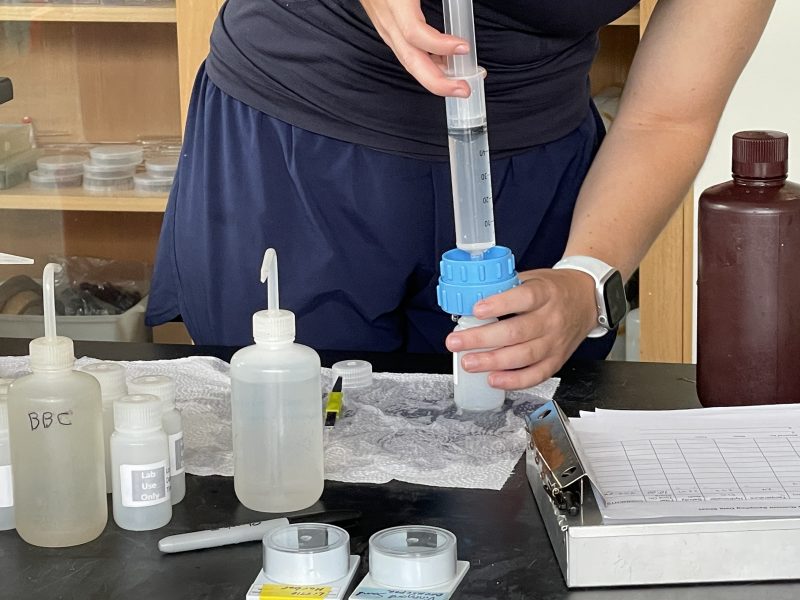Coalition Scientists Shift Gears From Summer to Winter Work
There are signs that summer is over all around us – the leaves turning colors, the days shortening. The Coalition’s science staff measures the end of summer by the dropping temperatures on our water monitoring loggers. Those falling temperatures mean it is time to pull monitoring equipment out of the water for the winter, activity that has been happening around the Bay this past month.
 At the Marion Science and Field Operations Center, Baywatcher volunteers are returning their sampling kits. Over 180 citizen scientists supported the Coalition’s 31st consecutive monitoring season. They began collecting data in late-May, going out in the early morning about every five days to their respective sampling sites until late-September. Baywatchers record the results of their measurements of the temperature, salinity, clarity, and amount of dissolved oxygen in the water on paper data sheets. Once the monitoring season ends, Director of Monitoring Programs Tony Williams enters the information into our database, checking for data quality as he goes. Once all the data is entered – representing about 5,000 water samples from around the Bay – additional rounds of data review are necessary, comparing measures from this year with previous years, with nearby stations, with weather events, etc. Data review is a mammoth task that takes a significant chunk of the fall and winter months. Making sure the data are accurate, however, is critical as it often used by officials from local and state agencies and the federal government as they make decisions that impact the water quality in Buzzards Bay.
At the Marion Science and Field Operations Center, Baywatcher volunteers are returning their sampling kits. Over 180 citizen scientists supported the Coalition’s 31st consecutive monitoring season. They began collecting data in late-May, going out in the early morning about every five days to their respective sampling sites until late-September. Baywatchers record the results of their measurements of the temperature, salinity, clarity, and amount of dissolved oxygen in the water on paper data sheets. Once the monitoring season ends, Director of Monitoring Programs Tony Williams enters the information into our database, checking for data quality as he goes. Once all the data is entered – representing about 5,000 water samples from around the Bay – additional rounds of data review are necessary, comparing measures from this year with previous years, with nearby stations, with weather events, etc. Data review is a mammoth task that takes a significant chunk of the fall and winter months. Making sure the data are accurate, however, is critical as it often used by officials from local and state agencies and the federal government as they make decisions that impact the water quality in Buzzards Bay.
In addition to the data collected by our Baywatcher citizen scientists, a few years ago the Coalition also started to employ data loggers. These are small instruments that are placed in the water and record temperature, salinity, and dissolved oxygen every 15 minutes, 24 hours a day. Initially there were three loggers, but grant funding from the MassDEP has allowed the Coalition to expand the network of loggers to 14 locations around Buzzards Bay and Martha’s Vineyard coastal ponds. The loggers are also being pulled out of the water for the season this month. They need cleaning and an end of season inspection. Even though there are fewer of these instruments, they generate many, many data points. Reviewing these data for accuracy will also be an important component of the Coalition science staff’s fall and winter work.
To get information about what is happening in the center of Buzzards Bay and Vineyard Sound, the Coalition has its own research vessel that collects offshore samples and services a water quality buoy off of West Island, Fairhaven. Captain Jeff Smith and the R/V Helen K were out on the water four or five days a week all summer. In addition to its regular work collecting water quality samples, the R/V Helen K also facilitated a number of special projects, including transporting scientists from the Woods Hole Oceanographic Institution so that they could collect water samples to assess microplastics in the water. The R/V Helen K also was used as a platform for work on the Buttonwood to Bay Project, facilitating the collection of water quality and sediment samples. After a successful season, the R/V Helen K was recently pulled out of the water and will spend the winter in the barn at the Marion Field Operations Center, where Captain Jeff will make sure she is well taken care of and ready to get back out on the water next summer.
Even in the cold months, when the Coalition’s Science staff transitions to working mainly inside, we’re thinking about and planning for the following May when the weather begins to warm up and we’re back out on the water again. Postings for next summer’s seasonal staff positions will go live in December or January, roles that will include assisting with both water quality and salt marsh monitoring.